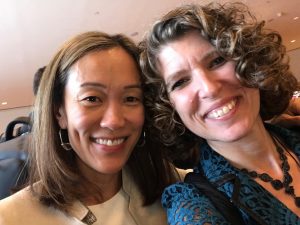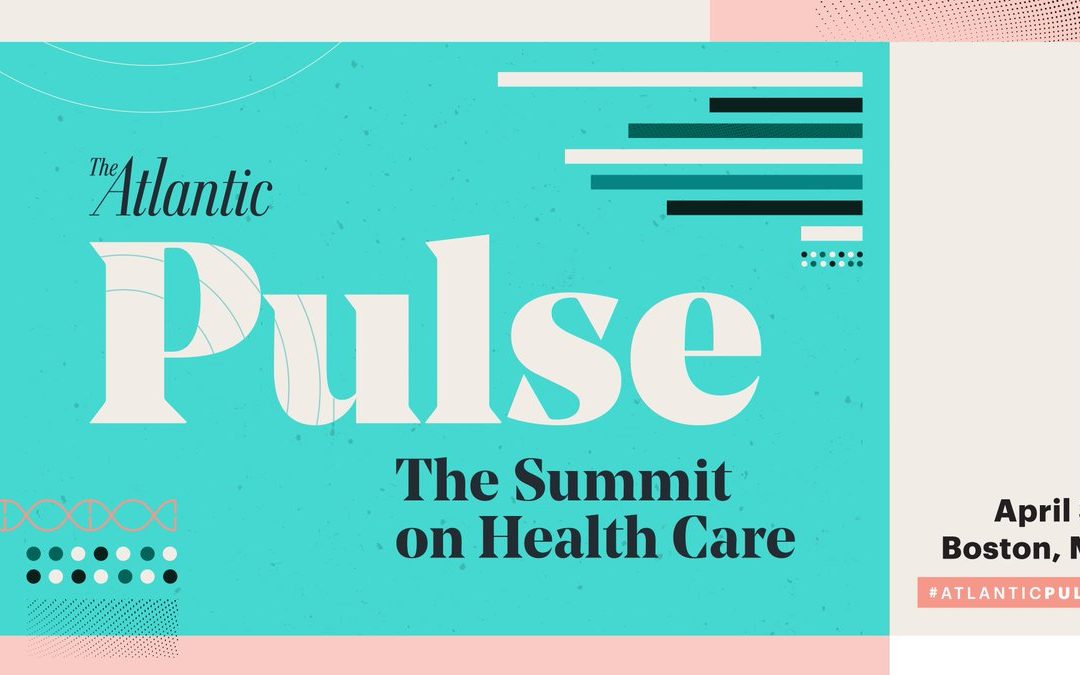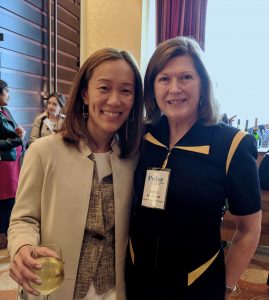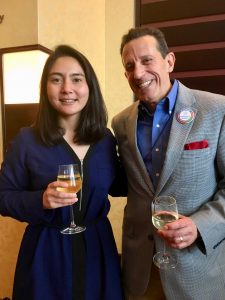On Tuesday, April 30, a roomful of health care insiders enjoyed a series of rapid-fire, TED-esque talks, interviews, and panels by leading health care voices at The Atlantic Summit on Health Care (#AtlanticPulse). Several SPM members attended the forum, and we reflected on the most salient themes we took away.
- Time’s Up, health care! The power and value of diversity was on display throughout the day, as was evidence that health care has a long way to go before the professionals in
the field reflect the full heterogeneity of American patients. Laura Riley and Neel Shah spoke about maternal health and the U.S.’ abysmal mortality rates. Leana Wen forcefully drove home the importance of access to maternal health care services and emphasized that effective maternal health doesn’t begin or end with pregnancy. Esther Choo reviewed the literature showing that women don’t get the standard of cardiac care an

Esther Choo and Deb Gordon
d have worse outcomes after stroke. She also described research showing lower mortality when female physicians are providing care or simply on the teams providing care. We need to address disparity in the health care work force as one path to reducing disparities in treatment and health outcomes.
- Ask, listen, and design for the community. One of Laura Riley’s prescriptions for improving maternal outcomes was to pay attention to what the community needs and wants, and design care specifically around those wishes. Tufts University nutrition professor Christina Economos noted the power in the community; social change requires will, which you can find within the communities you serve. Garth Graham of the Aetna Foundation suggested that solutions that positively impact individuals require authentic respect and engagement with communities where they live.
- They is us. We ought not think about them, they, those people. Garth Graham urged the audience to consider our language, and our perspective. “When you say them, you mean me, and us,” he said.
- Social isolation is a looming crisis. Baby boomers are less likely to be married and have children, and they have fewer social connections than their parents, explained Professor Robert Putnam. Social isolation has been shown to be as big a risk factor for mortality as smoking. ‘It’s as if a generation has been smoking their whole lives,’ he described. Who will care for Boomers and younger generations without the informal social networks to do so?
- And the winner is….In comparing the US health care system to other industrialized nations, Ezekiel Emanuel said that our system comes in first place—for having the most complicated system. We excel at innovating in how we pay doctors and hospitals, but what we need is a major overhaul to our payment system. The best system for consumer choice — where people can go to any doctor they choose — is, according to Emanuel, Germany.
- It’s possible if we believe it is. ‘I’ve yet to meet a capitalist who doesn’t want their children to be as healthy as possible for as long as possible,” said Sandro Galea. Same for socialists. Health equity is influenced by economic factors, but ought to transcend politics. He argued for a Health New Deal to close the increasing life expectancy gap between the top wealthiest 1% of Americans and everyone else. Wealthier Americans live on average 10-15 years longer than the ‘health have-nots’. Money buys power and place, and ultimately, health. To adjust this inequality we must first believe we can.
- Courage is essential. When Theranos whistleblower Erika Cheung realized she would not have been willing to test Theranos products on her own
sister, she questioned why she would do so on anyone else. She didn’t attribute her whistleblowing to courage, simply to following the evidence and appropriate protocols. But how amazing is it that someone in their early 20s would have the moral clarity to call BS, and the commitment to follow through, in the face of personal and career risks. It can be hard to recognize and take action when you want to believe in the promise of a charismatic leader or compelling new technology. We should all have the moral fiber of Erika Cheung.
- Health care struggles to keep pace with technological. Absent heroes like those in the Theranos case, strange and potentially terrible things can happen. The case of the CRISPR baby (from genetically altered germ cells) in China highlights what happens when no one speaks up or steps up, or when there are not systems for reporting unethical behavior. Since technology moves faster than most health care operations, it’s difficult to create those systems of accountability in advance of the technological capabilities. Thinking ahead, but also adapting to new realities, is vital.
- Commit to culture change. To achieve culture change in an organization, as Robert Grossman has at NYU Langone Health, first seek to understand the aspirations of the organization, and then tie strategies to those aspirations. Culture is the biggest and hardest aspect of an organization to change, but it offers the most opportunities for growth and impact.
Several of these themes are central tenets to the concept, philosophy, and practice of participatory medicine. By embracing diversity, authentic listening, respect for communities’ needs and preferences, fostering connection, and individual leadership, courage, and commitment, we can transform the culture of health care to be more inclusive, equitable, and effective.









Recent Comments